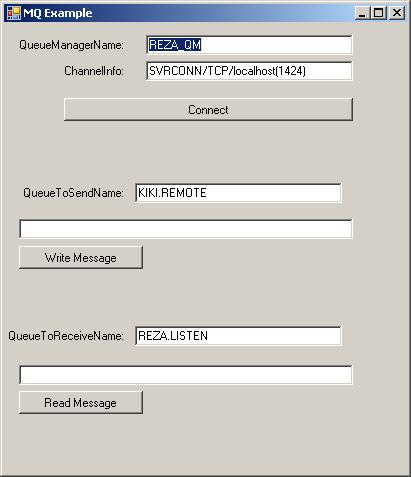How to Setup a Websphere MQ with C# .NET: GUI to Put/Get to Local & Remote Queues
4.67/5 (2 votes)
Example to Put/Get Messages to Local and Remote Queues for Websphere beginners

Introduction
This very basic article will show you how to write simple MQ programs in C# .NET as well as how to configure the background IBM Websphere Queue Manager.
Background
This example is more directed towards how to setup the Websphere MQ for communication to/from Local & Remote Queue Managers and how to create a C# .NET GUI. I've included a setup guide for the Queue Manager within the zipped source.
The Websphere DLL is also included within the source code.
Using the Code
Create a Windows Application copying the code found in Form.cs. Create the form as shown in the screenshot. The only label not visible is one called lblConnect to hold the results of hitting the Connect button.
The MQTest.cs can be taken and used anywhere communication with a Queue Manager is required.
/// MQTest.cs
using System;
using System.Collections.Generic;
using System.Linq;
using System.Text;
using IBM.WMQ;
namespace MQExample
{
/// <summary>
/// Author: Reza Servia
/// Name: MQTest.cs
/// Description:
/// MQ Manager Class
/// Put/Get Messages To/From Local Queue
/// </summary>
public class MQTest
{
MQQueueManager queueManager;
MQQueue queue;
MQMessage queueMessage;
MQPutMessageOptions queuePutMessageOptions;
MQGetMessageOptions queueGetMessageOptions;
static string SendQueueName;
static string ReceiveQueueName;
static string QueueManagerName;
static string ChannelInfo;
string channelName;
string transportType;
string connectionName;
string message;
public MQTest()
{
//Initialization
/*
QueueManagerName = "QM_TEST";
QueueName = "QM_TEST.LOCAL.ONE";
ChannelInfo = "SVRCONN/TCP/localhost(1424)";
*/
}
/// <summary>
/// Connect to MQ Server
/// </summary>
/// <param name="strQueueManagerName">Queue Manager Name</param>
/// <param name="strChannelInfo">Channel Information</param>
/// <returns></returns>
public string ConnectMQ(string strQueueManagerName, string strChannelInfo)
{
QueueManagerName = strQueueManagerName;
ChannelInfo = strChannelInfo;
char[] separator = { '/' };
string[] ChannelParams;
ChannelParams = ChannelInfo.Split(separator);
channelName = ChannelParams[0];
transportType = ChannelParams[1];
connectionName = ChannelParams[2];
string strReturn = "";
try
{
queueManager = new MQQueueManager(QueueManagerName,
channelName, connectionName);
strReturn = "Connected Successfully";
}
catch (MQException exp)
{
strReturn = "Exception: " + exp.Message;
}
catch (Exception exp)
{
strReturn = "Exception: " + exp.Message;
}
return strReturn;
}
/// <summary>
/// Write Message to Local Queue
/// </summary>
/// <param name="strInputMsg">Text Message</param>
/// <param name="strqueueName">Queue Name</param>
/// <returns></returns>
public string WriteLocalQMsg(string strInputMsg, string strQueueName)
{
string strReturn = "";
SendQueueName = strQueueName;
try
{
queue = queueManager.AccessQueue(SendQueueName,
MQC.MQOO_OUTPUT + MQC.MQOO_FAIL_IF_QUIESCING);
message = strInputMsg;
queueMessage = new MQMessage();
queueMessage.WriteString(message);
queueMessage.Format = MQC.MQFMT_STRING;
queuePutMessageOptions = new MQPutMessageOptions();
queue.Put(queueMessage, queuePutMessageOptions);
strReturn = "Message sent to the queue successfully";
}
catch (MQException MQexp)
{
strReturn = "Exception: " + MQexp.Message;
}
catch (Exception exp)
{
strReturn = "Exception: " + exp.Message;
}
return strReturn;
}
/// <summary>
/// Write Message to Local Queue
/// </summary>
/// <param name="strInputMsg">Text Message</param>
/// <returns></returns>
public string WriteLocalQMsg(string strInputMsg)
{
string strReturn = "";
try
{
queue = queueManager.AccessQueue(SendQueueName,
MQC.MQOO_OUTPUT + MQC.MQOO_FAIL_IF_QUIESCING );
message = strInputMsg;
queueMessage = new MQMessage();
queueMessage.WriteString(message);
queueMessage.Format = MQC.MQFMT_STRING;
queuePutMessageOptions = new MQPutMessageOptions();
queue.Put( queueMessage, queuePutMessageOptions);
strReturn = "Message sent to the queue successfully";
}
catch (MQException MQexp)
{
strReturn = "Exception: "+ MQexp.Message;
}
catch (Exception exp)
{
strReturn = "Exception: "+ exp.Message;
}
return strReturn;
}
/// <summary>
/// Read Message from Local Queue
/// </summary>
/// <param name="strqueueName">Queue Name</param>
/// <returns>Text Message</returns>
public string ReadLocalQMsg(string strQueueName)
{
string strReturn = "";
ReceiveQueueName = strQueueName;
try
{
queue = queueManager.AccessQueue(ReceiveQueueName,
MQC.MQOO_INPUT_AS_Q_DEF + MQC.MQOO_FAIL_IF_QUIESCING);
queueMessage = new MQMessage();
queueMessage.Format = MQC.MQFMT_STRING;
queueGetMessageOptions = new MQGetMessageOptions();
queue.Get(queueMessage, queueGetMessageOptions);
strReturn = queueMessage.ReadString(queueMessage.MessageLength);
}
catch (MQException MQexp)
{
strReturn = "Exception: " + MQexp.Message;
}
catch (Exception exp)
{
strReturn = "Exception: " + exp.Message;
}
return strReturn;
}
}
}
History
- 2nd July, 2009: Initial post
